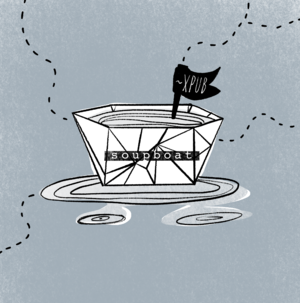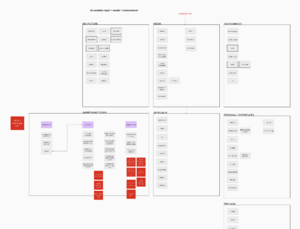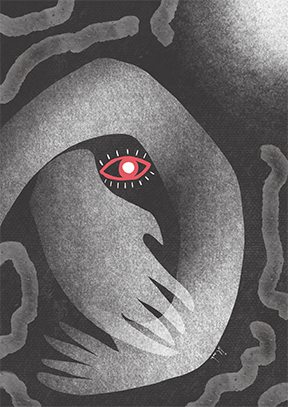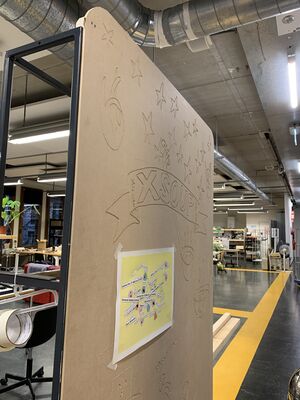User:Ålnik: Difference between revisions
| Line 18: | Line 18: | ||
== XPUB1 == | == XPUB1 == | ||
=== Special Issue #16: Vernacular languages processing ▶▶ [[Special Issue 16 Works | === Special Issue #16: Vernacular languages processing ▶▶ [[Special Issue 16 Works]] === | ||
With our Special Issue 16 and prototyping classes, we aimed at combining programming with processing natural language. Thus, we started with Python (from scratch) and played with ways to process text. Each week we had to go through reads about Python and to learn to code step by step. At the same time, we also had reading sessions with Cristina and research, reading and writing with Steve. [https://pzwiki.wdka.nl/mediadesign/Special_Issue_16_Works_by_%C3%85l_Nik Here are the (mini)projects I worked on]. | With our Special Issue 16 and prototyping classes, we aimed at combining programming with processing natural language. Thus, we started with Python (from scratch) and played with ways to process text. Each week we had to go through reads about Python and to learn to code step by step. At the same time, we also had reading sessions with Cristina and research, reading and writing with Steve. [https://pzwiki.wdka.nl/mediadesign/Special_Issue_16_Works_by_%C3%85l_Nik Here are the (mini)projects I worked on]. | ||
Revision as of 12:22, 27 March 2022
Hello, world! Ål here :)
About
Digitart, illustration, visual facilitation & scribing, graphic design. Looking for experimenting with tools, researching peculiar topics and finding focus before the end of XPUB2. ;)
XPUB1
Special Issue #16: Vernacular languages processing ▶▶ Special Issue 16 Works
With our Special Issue 16 and prototyping classes, we aimed at combining programming with processing natural language. Thus, we started with Python (from scratch) and played with ways to process text. Each week we had to go through reads about Python and to learn to code step by step. At the same time, we also had reading sessions with Cristina and research, reading and writing with Steve. Here are the (mini)projects I worked on.
Special Issue #17: Productive Play ▶▶ Special Issue 17 Work
With our second issue and the seventeenth one for XPUB, we dived into the topic of "productive play", led by artist and researcher Lídia Pereira. During the reading sessions, we have elaborated on gamification, video games, monetisation mechanics and all of those's impacts on our work & personal life. In order to reflect on the topic, we formed reading groups and made discussions in class. Here are all of the (mini)projects I was part of during this special issue.
XPUB2
One sentence master project ideas.
0. Research and documentation
In order to help myself learn how to document (better) and how to do a (proper) research, I joined Harma Staal's workshop at the Research Station: Tagging Topics (20/03/2022). She offered a way to do research using tagging and thinking of topics in tags. The purpose is to narrow down the content - from chaos to focus.
With this approach, the researchers are invited to connect their work and interests with other makers. (maker is now my new favourite word) As artists, we want to speak about perspectives, opinions, notions. Not truths.
Research is not about reading books. It starts with your making. Then, document it, reflect on it, talk about it. Share your knowledge and make new knowledge. When you talk about things you found out, makes them relevant.
Share that with image and text.
1. Discover my interests and map them
I started with quite broad topics and put them on the board. The next steps was to sort them out and put into groups. Whilst doing that, I identified three main groups of tags that once combined, can create a single project.
main tags to connect:
[topics]
[media/medium]
[environment]
additional ones:
[approach]
[personal experiences]
[feelings]
[Homework] to elaborate on 2-3 topics
In order to do that, I made this Mural board.
[Up next] to identify which topics are interesting for me to research more (and get happily lost into the Rabbit Hole)
Station Skills
Most of the station skills I joined during my second trimester are related to writing. The reason is that I feel quite insecure in my writing and have been criticised before for bad writing. Thus, I am trying to improve my writing in English, which I still find challenging because it is not my native language, nor alphabet.
RE:Writing
17 November 2021 This workshops was the first station skill I attended, because I was stressed at the beginning of XPUB and wanted to make sure I can manage everything. I went to the RE:Writing because I wanted to listen to some random stories, get outside the special issue thoughts and illustrate something. Whilst listening to the short stories and poems, I illustrated one of them: It All Started by Kristiāna N.
Tagging Topics
20 January 2022 In order to help myself learn how to document (better) and how to do a (proper) research, I joined Harma Staal's workshop at the Research Station: Tagging Topics. She offered a way to do research using tagging and thinking of topics in tags. The purpose is to narrow down the content - from chaos to focus.
With this approach, the researchers are invited to connect their work and interests with other makers. (maker is now my new favourite word) As artists, we want to speak about perspectives, opinions, notions. Not truths. Research is not about reading books. It starts with your making. Then, document it, reflect on it, talk about it. Share your knowledge and make new knowledge. When you talk about things you found out, makes them relevant. Share that with image and text.
Wood Workshop
21 January 2022 Together with Chae, Kamo and Erica, we visited the wood workshop in order to make a wooden board. We imagined it to be a place to harvest ideas, hang stuff and move around the studio on wheels. For the first time I cut such a big wooden surface on the big cutting machine. After that, with the small cutting machine I curved one of the 4 corners. Nice collective moment indeed.
Crash Course in Typography
24-26-28 January 2022 The typography class by Britt Möricke took place at the Publication Station. We had three classes within a week to go through the basics of typography and to learn the rules (so we can break them, hehe). We dived into the history of typography, the theoretical rules and did several practical exercises on Adobe InDesign. I did not work with that programme that much before, so it was quite useful for me; and also to get to know a bit better some basic rules on compiling long body text. We also did some fun exercises on typo-posters.
My handwriting sucks! Now what?
3 February 2022 Another workshop by Britt Möricke who presented to us a handwriting handbook she had developed. We did exercises to train cursive writing.
Writing as reflection, writing as practice. Experimental Research Documents workshop
24 February 2022
"Writing as a form of thinking. Writing as a manifestation of thoughts. Writing as a struggle. Write as a chore. Writing as practice. There are so many ways of thinking about writing and so many different forms of writing."
In that workshop by Michelle Teran we did various short writing activities such as writing a letter to our recent project. We experimented with ways of thinking about the role of writing in our research projects. The second part of the session was more focused on examples (in a form of a presentation).




